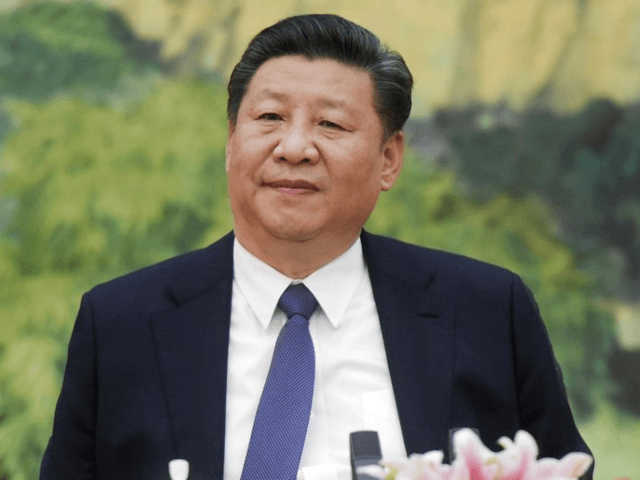A series of columns in Chinese government-controlled media on Tuesday condemned the United States for policies to protect American industries and national security from the Communist Party, calling the Trump administration’s trade policy “the most barbarian method ever in the history of modern international economic and trade relations.”
The People’s Daily, the official newspaper of the Communist Party of China, and Xinhua, Beijing’s more superficially objective news source, both published columns claiming that President Donald Trump had set into motion a series of events that would irreparably damage the U.S. economy. The People’s Daily, in one column, asserted that “International relations will never go back to barbarian era,” Trump’s trade strategy was “ridiculous,” and that the world has rejected Washington’s distrust of the Chinese.
“By interfering with the naturally developed global industrial chain by supremacy, the US has adopted the most barbarian method ever in the history of modern international economic and trade relations. It is nothing but ridiculous and hegemonic,” the column proclaimed. “It’s obvious to all that China never fears any threats and is ready to cope with challenges. The US, though acting arbitrarily at present, will finally exhaust its energy one day.”
“The wayward decision of the US government on its foreign trade policy is considered ridiculous by the global media,” the piece declared. “Though the US is claiming again and again that it is a winner in the trade war, the international community just thinks the other way, because the arbitrary acts of Washington are stupid which have ruthlessly given a blow to the US agriculture and hurt the interests of US consumers and enterprises.”
“In addition, the acts also severely damaged the global industrial chain that once greatly benefited the US,” it alleged, accusing the Trump administration of “superficial views, unreason and lack of morality.”
In another piece, written by the People’s Daily equivalent of the editorial board, the newspaper defends China’s rampant intellectual property theft, which it uses to then compete with American companies by selling cheaper versions of their own products. The newspaper denied this claim, instead alleging that intellectual property theft cases were “initiated by the U.S. for the purpose of escalating economic and trade frictions and suppressing China in the disguise of justice.”
“Although the U.S. side has been loud and seemingly have incontestable proof of what they were saying, facts are always facts, and such lies about China as ‘stealing intellectual property’ can hardly make anyone believe,” the People’s Daily claims. “The U.S. made groundless accusations against China based on pure assumption while disregarding justice. If the report is based on imagined or selective data, it’s a kind of science fiction novel.”
“In the hands of the U.S.,” the People’s Daily protests, intellectual property theft accusations have “become a political tool, a weapon to contain other countries, and a veil for bullying the world.”
Chinese theft of American intellectual property was estimated to cost the United States between $150 billion and $600 billion a year by 2017. President Trump’s National Security Strategy identified the theft as a major national security threat.
Xinhua took a more measured tone in condemning the United States in an article Tuesday, accusing Washington of adopting “old-fashioned protectionism” to its detriment.
“[T]he egoistic practice commonly used by the U.S. will be much of a boomerang, hurting itself and casting dark clouds over the global economy,” Xinhua proclaimed. “A trade war has no winners. The initiator is more likely to suffer. It is in the interests of all to uphold positive-sum cooperation and multilateralism, build an open global economy and strive for shared, inclusive growth. Egoistic and autarkic policies are unrealistic and go nowhere.”
Xinhua concluded that trade negotiations with China have “boosted the risk of a U.S. recession.”
The wave of belligerent editorials in Chinese media follows threats from Chinese officials. Last week, Foreign Minister Wang Yi reportedly warned Secretary of State Mike Pompeo not to “go too far” in curbing Chinese violations of international law in trade.
“Noting that the U.S. side has recently made remarks and taken actions that are harmful to Chinese interests in various fields, including cracking down on Chinese enterprises’ normal operations through political measures, Wang said China strongly opposes such actions,” according to Xinhua.
Communist Party chief Xi Jinping used a visit to a rare-earth mineral mine Monday to imply that China may deprive the U.S. of sales of the minerals, commonly used in computers, mobile phones, and other technology. Xi also used the visit to commemorate the Long March, Mao Zedong’s 4,000-mile military trek to defeat Chinese Nationalists in 1934.
China is responding to months of new policies from the Trump administration meant to balance the trade relationship between China and Washington and prevent China from using de facto state-controlled corporations to infiltrate U.S. intelligence. Trump raised tariffs on several Chinese imports to 25 percent this month and signed an executive order that prevents foreign technology corporations from doing business in the U.S. if they pose a threat to national security interests, a move many interpreted as targeting the Chinese telecommunications corporation Huawei.

COMMENTS
Please let us know if you're having issues with commenting.